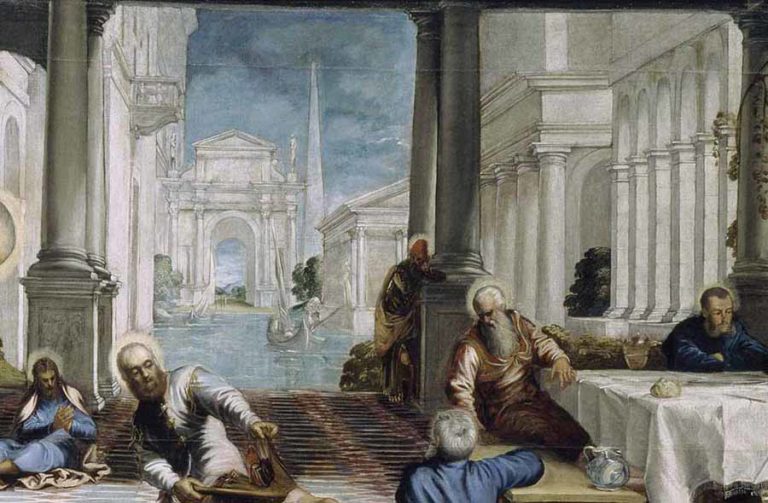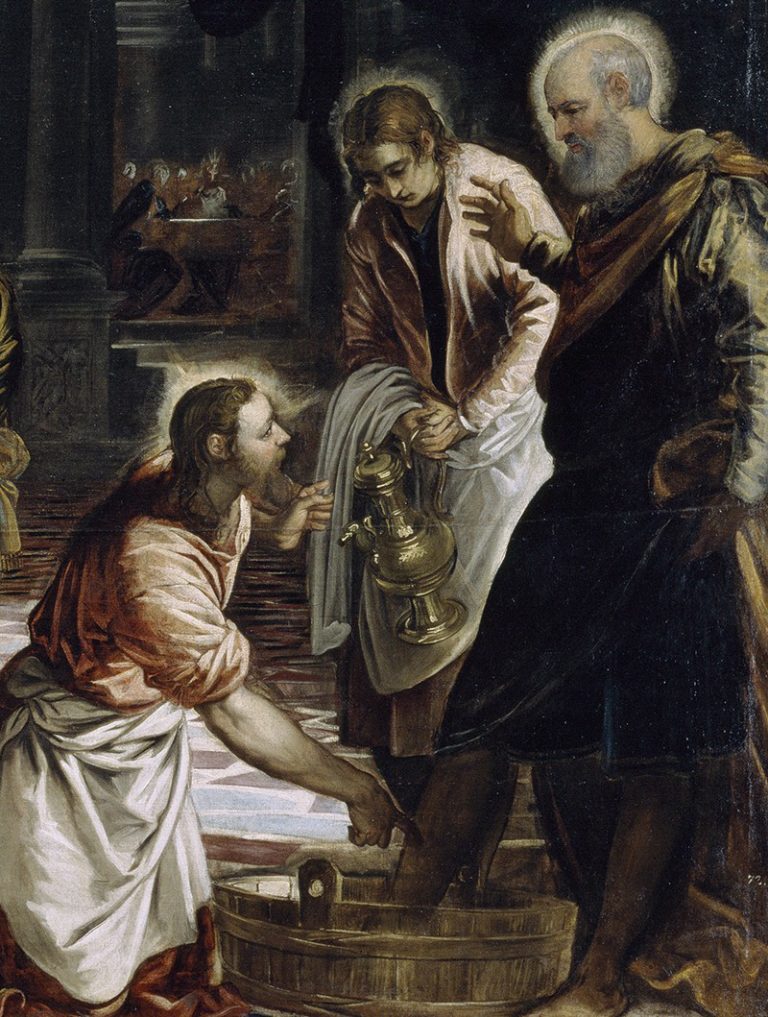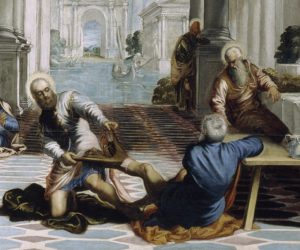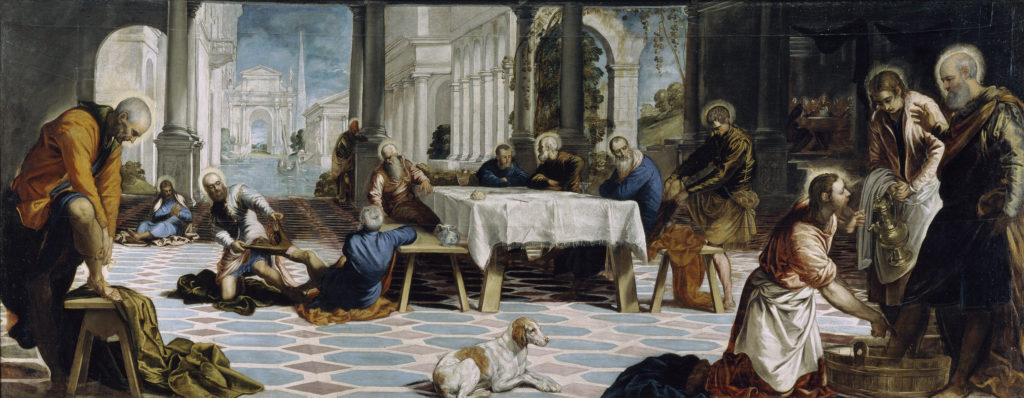Take a journey on Jesus’ “Way of the Cross” with the Great Masters. This is the second of 12 meditations to take you through Lent.The narrative of today’s painting is simple and yet its significance is revolutionary. The Gospel of John recites: “Jesus got up from the table removed His outer garment, and taking a towel wrapped it around his waist. Then he poured water in a basin and began to wash the disciples’ feet.” Clearly, Jesus employs simple ordinary means to express His magnificent extraordinary love.
The love for this theme of art is best expressed by the Italian painter “Tintoretto” (1548-49). Born Jacopo Comin, Tintoretto (the little dyer) took his name from his father’s profession of dyeing (tintore in Italian). Noticing the paint daubs on the dyer’s wall, his father apprenticed him to the studio of Titian. However, as fate would have it, Titian sent the young chap home in 10 days, apparently jealous of his extraordinary skills.
These spectacular skills were spelled out in most of his paintings with phenomenal energy that earned him the moniker “Il Furioso.” He imitated the bold muscular style of the Mannerist school of art while emulating the color and light of the Venetian school. It is with this noble conception that he placed above his studio a plaque that read, “Il disegno di Michelangelo et il colorito di Tiziano” (The design of Michelangelo and the color of Titian).
Tintoretto staged his narratives like a theater director. He employed light and dark, foreshortening in order to transform religious scenes into enthralling performances. The spirit of the Counter Reformation reverberated through his art works. One such work is “Christ washing His disciples’ feet.” Painted in 1548-49 for the Church of St. Mark, currently it is on display at the Prado Museum in Spain.
Tintoretto approaches the narrative in a practical manner. The foot washing would have probably lasted for 40 minutes. He therefore does not paint his subjects in solemn silence. The scene is set in a classical Renaissance hall paved by a linear floor. As color and perspective unite, the vanishing point of the painting merges with the landscape of white palatial buildings. Inspired by the illustrations by Sebastiano Serlio, the buildings border a canal with boats sailing through it. The serene Venetian architecture invokes a dream-like atmosphere. Everything seems calm on the outside in an absolute contrast of the madness inside.

At first glance, the modern day viewer would perhaps have to pace around in order to discover the essential protagonist. Christ is spotted at the lower right corner of the painting explaining to Peter the significance of the moment. Young John assists his Master in meekness as he holds the ewer and the towel.

John stands as a humble witness to Christ expressing His divine love not in the abstraction of words but rather in pure action of his deeds. This action is resounded by the second most important episode of the day, i.e. “The Last Supper.” This is observed at the background, in a room beyond the portal.
Most of the canvas is occupied by a rectangular wooden table carelessly covered with a crumpled white cloth. The disciples, having had their feet washed, are gearing up for the meal, some chatting about, others lost in random observation. One of them in a green cloak is seen donning his stockings with the support of the bench.

Apparently absurd is the depiction of one apostle helping another to take off his hose. This detail is comical pursuing a natural and non-idealized depiction of the subject. To our extreme left stands another apostle redoing his sandals using a stool. His gestures suggest serious contemplation with certainly no attention paid to the Laurel and Hardy scene is the background.
The composition is definitely off-centered with the main episode displaced at the side. But this was a genius too, for the original location of the painting was on the right wall of an elongated room. Thus the viewer looking at it from the right first encounters Christ. Thanks to the paving of slabs, geometric shapes, atmospheric perspective and the remarkable foreshortening the viewer is drawn to an animated drama with a sensational sense of spatial depth.
Intriguingly, in the midst of this human hustle is seated a dog standing for faithfulness; faithfulness that is at stake at this grave hour. The dog looks at good ol’ Peter who would imminently deny Christ three times. At the far end of the background is poised a shadowy figure, leaning against a pillar. He is ill at ease and at war at heart. Isolated from the rest, he seems lost in the jingling of his pocket.

One can hardly imagine the encounter between him and the man he’d just sold to death. As Christ washed his feet did he squirm for being the scoundrel? Did he surmise that Christ knew that he knew the Gethsemane plan? Or did he just share a cold shoulder with His Master while uttering those meaningless words, “Is it I, Lord?”
Although betrayal nestled in the heart of Judas, the love that Jesus had for him did not waver. He washed the feet of all his disciples including those who would soon desert him; of Peter, who would deny Him and of Judas who had sold him. Jesus that night rejected the throne for a towel, for He wanted to set an example of love in service; a love that was not merely a feeling of affection but rather a revelation of Divine Power!
This article is published in partnership with Indian Catholic Matters.








